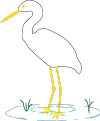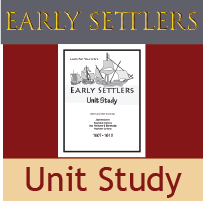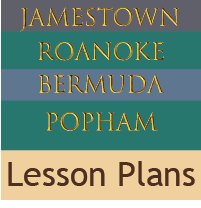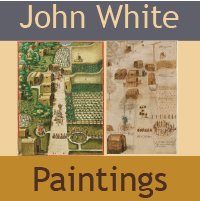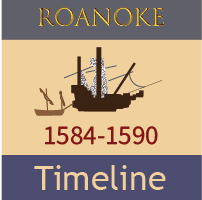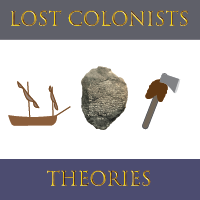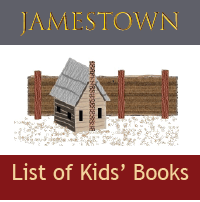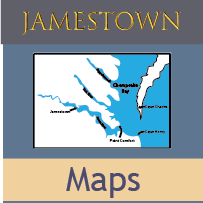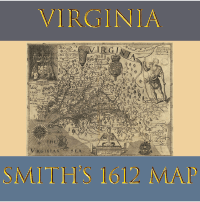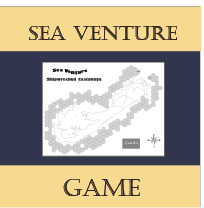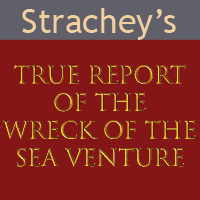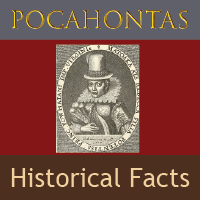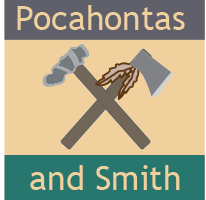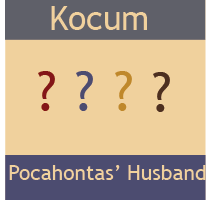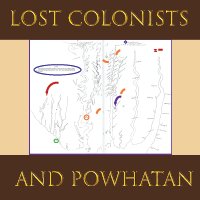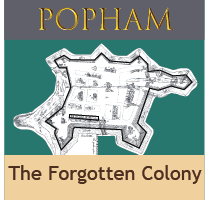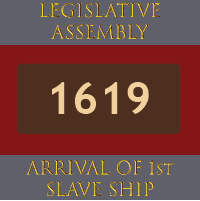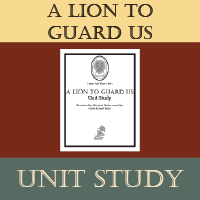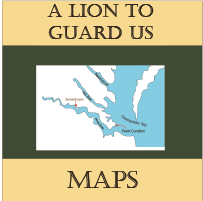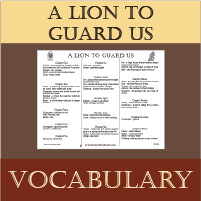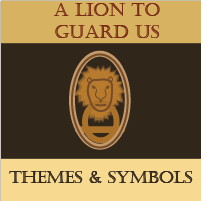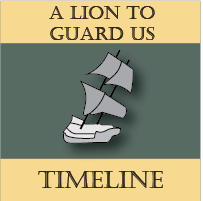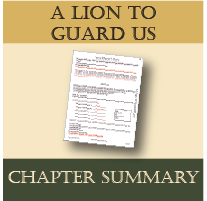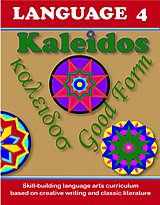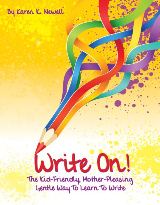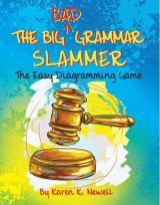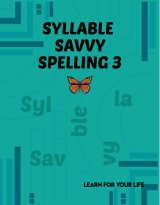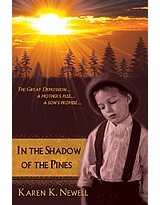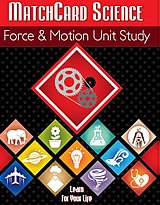Pocahontas Facts
Pocahontas was a real person in history, but what is truth and what is legend? Did she really rescue John Smith? Discover 18 facts about the real Pocahontas and draw your own conclusions.
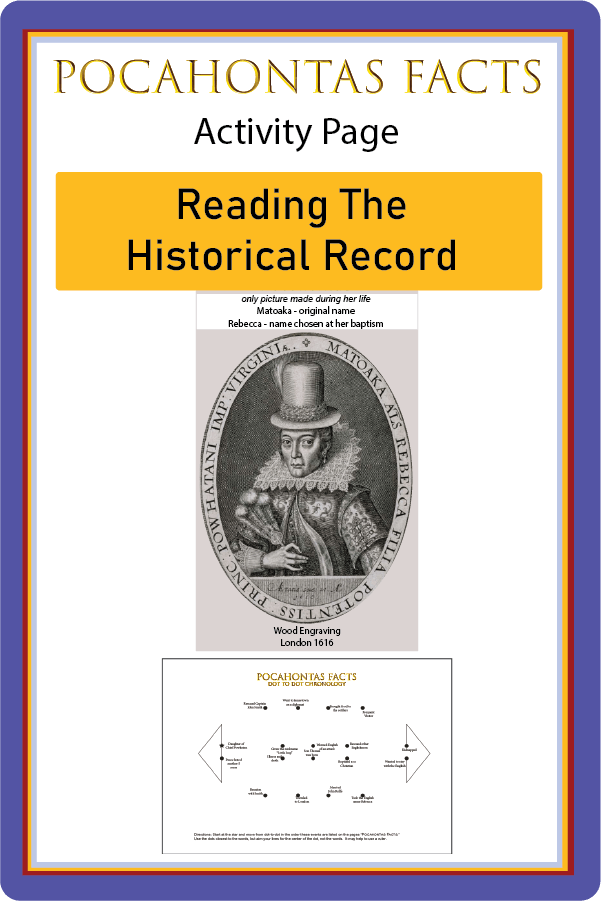
The Real Story of Pocahontas
During the development of the Jamestown Unit Study, the inevitable question arose: What to write about the story of Pocahontas and John Smith? Omit the most famous narrative of the Jamestown settlement altogether? Promote the story as established fact? Dismiss it as complete fiction?Let's start with research! With this task at hand, it quickly became apparent that opinions were easier to find than facts.
Below are the 18 facts written about Pocahontas contemporaneous with her life. Legends, movies, and oral traditions are not included as sources. The sources for the quotes are listed, with the name of author and date of publication. These documents are available for purchase in print or free on-line.
Keep in mind that just because something was written at the time Pocahontas was living doesn't guarantee it is true. (Not everything you read in the newspaper, for instance, is true.) However, the fact that it was written, and it's authorship and publication history are known, makes it an event that history can examine.
So...did all these events occur just as they were described? That is an on-going discussion.
About This Page
This page exists as an extended source of contemporaneous information about Pocahontas used in a activity in the Jamestown and Roanoke Unit Study. It provides additional quotes from those that are printed in the unit. See below for more information.Due to the amount of information, it is divided into two parts:
- Part 1: Facts #1 through 9 (below)
- Part 2: Facts #10 - 18 about Pocahontas - click on this link
- References are listed on both pages at the bottom
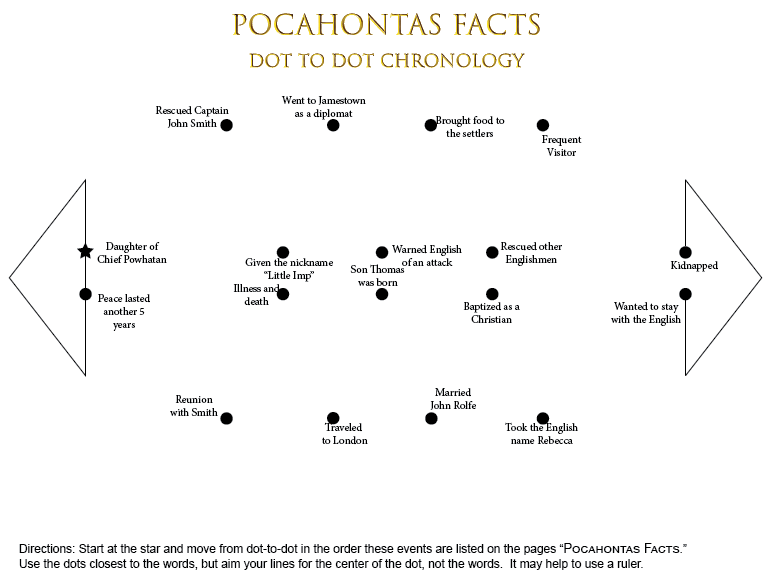
Pocohontas Facts Dot-to-Dot Worksheet
Completed activity reveals a native design
#1 Pocahontas was Powhatan's Favorite Daughter
Pocahontas is often referred to as Powhatan's favorite.From "Letter to Queen Anne"
Author - John Smith: Written 1616
especially from his son Nantaquaus, the most manliest, comeliest, boldest spirit, I ever saw in a Savage, and his sister Pocahontas, the Kings most dear and well-beloved daughter
From "The Generall Historie of Virginia, New-England,
and the Summer Isles
Author - John Smith: Published 1624
Pocahontas the King’s dearest daughter
later in the same book:For Pocahontas, his dearest jewel and daughter
From: A True Discourse
Author - Ralph Hamor; Written 1614, Published 1615
It chanced Powhatan's delight and darling, his daughter Pocahontas - whose fame hath even been spread in England by the title of "Nonparella of Virginia"
What Tribe Was Pocahontas From?
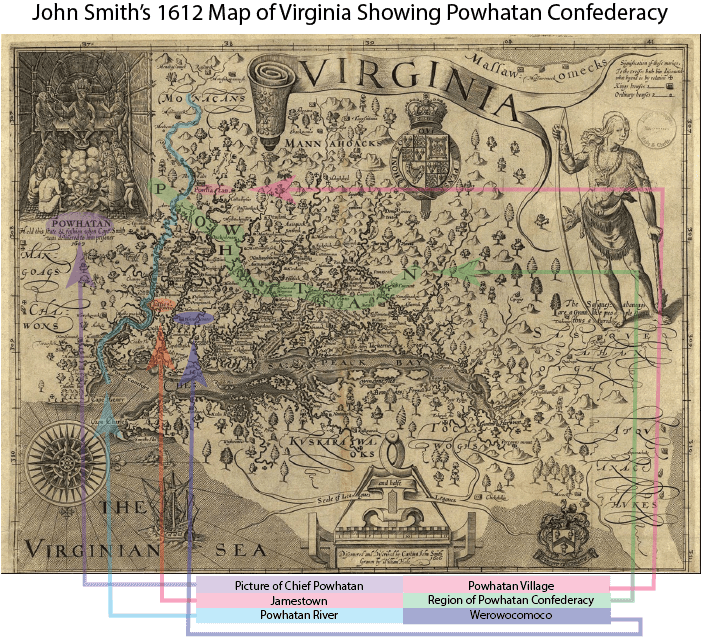
Map showing dominance of Powhatan's Influence
Powhatan's real name was Wahunsenacawh. He was the chief of the Powhatan tribe which was located about 20 to 30 miles west from Jamestown on the James River. Of course, the natives did not call their river after the English king. They called it the Powhatan River - demonstrating the significance of that particular tribe. He was a powerful military leader that led a confederacy of over 30 local tribes. Some have compared him to an emperor (though the coast of Virginia would be a rather small empire compared to the big empires in history.) As THE powerful and widely recognized leader that he was, he took the name Powhatan.
The Powhatan's and their neighboring tribes were part of the Algonquian people who were spread from the southern region of the United States up into Canada.
What we don't know: That Powhatan cared for her is obvious in the records that have come down. But did he himself refer to her as his favorite or dearest?
#2 Pocahontas Was Her Nickname
What Does Pocahontas Mean?
She is known to the generations that followed her as Pocahontas, but that was, we are told, her nickname. It means, "Playful one" or even "Little Imp."Historie of Travaile into Virginia Britannia
Author: William Strachey; Written 1612 to 1619
Both men, women, and children have their several names, at first according to the humor of their parents. And for the men-children at first, when they are young, their mothers give them a name, calling them by some affectionate title, or perhaps observing their promising inclination give it accordingly. And so the Great King Powhatan called a young daughter of his Pochahuntas, which may signify "little wanton," howbeit she was rightly called Amonute. At more ripe years, when they become able to travel into the woods and to go forth a-hunting, fowling, and fishing with their fathers, the father gives them another name as he finds him apt and of spirit to prove toward and valiant or otherwise, changing the mother's, which yet in the family is not so soon forgotten.
"Wanton" has a more negative connotation to some, and it is suggested that "Little Imp" or "Laughing one" is the best translation.What Was Pocahontas Real Name?
"Amonute" and "Matoaka" are her other Indian names that have come down to us. We don't know which was the original name the mother chose at birth and which was the name her father later designated.She was later known by an English name (see below) but it was Pocahontas - the playful, imp - by which she is known.
What we don't know: How would she have introduced herself (both as a child, then later as an adult?)
#3 Rescue of Captain John Smith
This is one of the most disputed events in the history of Pocahontas. Let's start with one of the only statements about the event:From "The Generall Historie of Virginia, New-England,
and the Summer Isles
Author - John Smith: Published 1624
Date of Occurrence: approximately December 1607 - during John Smith's captivity by native tribesIn 1607 Captain John Smith was captured by natives and held for several weeks. This event is pictured in the upper corner of Smith's famous map of Virginia. Later he would write:
two great stones were brought before Powhatan: then as many as could laid hands on [Smith], dragged him to them, and thereon laid his head, and being ready with their clubs, to beat out his brains, Pocahontas the King’s dearest daughter, when no entreaty could prevail, got his head in her armes, and laid her own upon his to save him from death, whereat the Emperour [Powhatan] was contented he should live to make him hatchets, and her bells, beads, and copper; for they thought him as well of all occupations as themselves.
With that one sentence Captain John Smith, intentionally or not, sparked one of America's first legends and created a debate that continues: did Pocahontas really rescue John Smith moments before certain death befell him?This is not a question that can be answered in one sentence. But for those eager to find the dividing line between history and legend, we give you an indepth analysis of the controversy of Pocahontas and John Smith's rescue.
What we don't know: If Powhatan did listen to his daughter, was Smith considered her prisoner, or brother or special charge?
#4 Pocahontas as A Young Diplomat
From "True Relation of such Occurrences and Accidents of Note as hath hap'ned in Virginia"
Author - John Smith: Published 1608
Date of Occurrence: approximately April 1608Smith was a captive of the Powhatans from mid November 1607 to early January 1608 as described above. In the weeks following, Smith reported a number of skirmishes with some natives and thefts of their weapons and tools, culminating in the capture of several natives.
Powhatan, understanding that we detained certain savages, sent his daughter, a child of ten years old, which not only for feature, countenance, and proportion much exceedeth any of the rest of his people, but for wit and spirit the only nonpareil [a person without equal] of his country. This he sent by his most trusty messenger, called Rawhunt, as much exceeding in deformity of person, but of a subtle wit and crafty understanding. He with a long circumstance told me how well Powhatan loved and respected me and, in that I should not doubt any way of his kindness, he had sent his child, which he most esteemed, to see me, and a deer and bread besides for a present, desiring me that the boy might come again, which he loved exceedingly. [The boy refers to the English child, Thomas Savage, who lived with the Powhatans for a time but their chief had recently sent back to Jamestown, and now requested his return.] His little daughter he had taught this lesson also... ...we guarded them as before to the church; and after prayer gave them to Pocahuntas, the king's daughter, in regard of her father's kindness in sending her. After having well fed them, as all the time of their imprisonment, we gave them their bows, arrows, or what else they had, and with much content sent them packing. Pocahuntas also we requited with such trifles as contented her to tell that we had used the Paspaheyans very kindly in so releasing them.
Smith did not have much time to write "True Relation" before the ship returned to England. This event is one the last paragraphs of the report, which was edited and published by the end of the year.#5 Pocaohontas Warned Smith of a Coming Attack
From "The Generall Historie of Virginia, New-England,
and the Summer Isles, Book 3
Author - John Smith: Published 1624
Date of Occurrence: Jan 1609This event took place one year after Smith's captivity and the legendary rescue scene described above. Smith was with several other settlers was at Werowocomoco village and "wrangling" with Powhatan for food. While both continually confessed their "love" for one another, the interaction was laced with hostility and accusations on both sides. After they retired for the night, Pocahontas came and warned Smith that after a time of feasting, the natives planned to kill them:
For Pocahontas, his dearest jewel and daughter, in that dark night came through the irksome woods and told our captain great cheer [ie. dinner] should be sent us by and by. But Powhatan and all the power he could make would after come kill us all if they that brought it could not kill us with our own weapons when we were at supper. Therefore if we would live she wished us presently to be gone. Such things as she delighted in I would have given her, but with the tears running down her cheeks she said she durst not be seen to have any, for if Powhatan should know it, she were but dead, and so she ran away by herself as she came.
From "Letter to Queen Anne"
Author - John Smith: Written 1616
Same Occurrence as abovewhen her father with the utmost of his policy and power, sought to surprise me, having but eighteen with me, the dark night could not affright her from coming through the irksome woods, and with watered eyes gave me intelligence, with her best advice to escape his fury; which had he known, he had surely slain her.
Some have questioned if it was possible that a young girl could travel that distance at night alone. However, they were staying right outside of her village of Werowocomoco so it would not have been a long trip.Modern voices have accused Pocahontas of being a traitor for this act as well as the one below. Certainly had she been a soldier or warrior, disclosing military plans to the enemy is considered a death-deserving deed.
However, it appears she was protecting a friend at the risk of her own life. Certainly as Smith recounts his version of the events, it appears that Powhatan was pretending to be an ally while scheming for the other's death. In which case, Pocahontas could be said to be a traitor to a traitor. Smith himself was highly suspicious of Powhatan at this exchange; part of what they argued about was the fact that Smith and company kept their weapons at their side.
War had not been declared, but tensions were definitely mounting.
What we don't know: Was Pocahontas a love-struck girl? A faithful friend? A traitor to her people? Or a far-sighted diplomat protecting her tribe from the retribution that would occur if Smith's company had been slaughtered?
#6 Pocahontas Helped Prevent Starvation in Jamestown
While Smith (and others) credit Pocahontas for bringing the starving settlers food, it should be noted that many tribes provided food - with the largest amount from Powhatan's tribes. The demand of the English for food from the natives was a major cause (one could even say THE major cause) of disaster for Jamestown and Roanoke. Imagine how the history might have changed if the Virginia Company had actually provided food for their own settlers instead of demanding it from the natives!From "Letter to Queen Anne"
Author - John Smith: Written 1616
Date of Occurrence: Multiple times
...such was the weakness of this poor commonwealth, as had the salvages not fed us, we directly had starved. And this relief, most gracious Queen, was commonly brought us by this Lady Pocahontas.
Notwithstanding all these passages, when inconstant fortune turned our peace to war, this tender virgin would still not spare to dare to visit us, and by her our jars have been oft appeased, and our wants still supplied; were it the policy of her father thus to employ her, or the ordinance of God thus to make her his instrument, or her extraordinary affection to our nation, I know not
#7 Pocahontas was a Frequent Visitor at Jamestown
This fact brings together more of the story. We have so far seen that she was sent to Jamestown as a child-emissary to secure the release of prisoners, brought food to them in the company of others, and warned Smith alone in the middle of the night of an impending attack on the outskirts of her native village. It appears that her father allowed and even sent her to Jamestown from the period of 1608 to 1611 where she was known to many of the settlers besides Smith.From "Letter to Queen Anne"
Author - John Smith: Written 1616
Date of Occurrence: Multiple timesShe visited Jamestown as frequently as Powhatan's village. Her village of Werowocomoco was about 12 miles from Jamestown, almost the closest neighbor.
Jamestown with her wild train she as freely frequented, as her fathers habitation; and during the time of two or three years, she next under God, was still the instrument to preserve this colony from death, famine and utter confusion
From The Historie of Travaile into Virginia Britannia
Chapter 5; page 65
Author - William Strachey - Written 1612
Strachey arrived in Jamestown May 1610 (8 months after John Smith left) and stayed until September 1611. He is most known for his account of the Sea Venture as he was one of the survivors. On his return to England, he wrote his own history of Jamestown. He and Smith were both writing at the same time, and apparently borrowing liberally from one another. (Plagarism was all the rage back then, but - he did give attribution.) Strachey's portrayal of Pocohontas is quite different from Smith's, but collaborates that she was a bold and frequent visitor to the fort....Pochahuntas, a well-featured but wanton young girl, Powhatan's daughter, sometimes resorting to our fort, of the age then of 11 or 12 years, get the boys forth with her into the marketplace and make them wheel falling on their hands, turning their heels upwards, whom she would follow and wheel so herself naked as she was all the fort over.
Strachey goes on to say that after age 12 she had to put on an apron like all the other women. It's quite the picture imagining the over-dressed European men, most who had never seen a woman's bare knees, watching as the naked and happy-go-lucky girl taught the boys how to do cartwheels.#8 Pocahontas Saved Henry Spelman & Richard Wyffin
The year after Smith's captivity (and reported rescue by Pocahontas), she saved two other Englishmen.Saving Richard Wyffin
Eleven colonists including Master Scrivener and Captain Waldo headed to the Isle of Hogs across the James River but the boat sank and all of them drowned.From "The Generall Historie of Virginia, New-England,
and the Summer Isles, Book 3, Chapter 9
Date of Occurrence: January 1609
The savages were the first that found their bodies, which so much the more encouraged them to effect their projects. To avertise the president of this heavy news none could be found would undertake it, but the journey was often refused of all in the fort until Richard Wyffin undertook alone the performance thereof.
In this journey he was encount'red with many dangers and difficulties in all parts as he passed. As for that night he lodged with Powhatan, perceiving such preparation for war, not finding the president there, he did assure himself some mischief was intended. Pocahontas hid him for a time and sent them who pursued him the clean contrary way to seek him. But by her means and extraordianry bribes and much trouble, in three days' travel at length he found us in the middest of these turmoils.
Saving Henry Spelman
From "The Generall Historie of Virginia, New-England,
and the Summer Isles, Book 3, Chapter 12
Author - John Smith: Published 1624
Date of Occurrence: Oct. 3, 1609Spelman was an English child who went to live with the natives. The day before the injured John Smith returned to England, there were an attack on the English.
Sickelmore, upon the confidence of Powhatan, with about thirty others as careless as himself were all slain, only Jeffrey Shortridge escaped; and Pokahontas, the king's daughter, saved a boy called Henry Spilman, that lived many years after by her means amongst the Patawomekes.
So Smith does not claim to be the only recipient of Pocahontas' missions of mercy.
#9 Pocahontas was Kidnapped by the English
That the English had the audacity to kidnap Powhatan's daughter who had befriended them is a fact; an ugly fact that cannot be disputed. To place that fact in historical context however, makes it more understandable, albeit it is still treacherous.The English and Powhatans had been exchanging "hostages" since their earliest encounter: Thomas Savage and Henry Spelman are mentioned above. Namontack and Machumps were the natives who went to England and returned. This was a peace-keeping strategy among "frenemies;" their possession of one of your members was meant to keep you from betraying them. These hostages were generally treated well, learned the culture and language, and assisted in negotiations.
And we have already seen that both the natives and the settlers kidnapped the others and held them as prisoners, as John Smith's narrative attests. These were not good neighbors to one another.
From: Private Leter to Hawes
Author - Samuel Argall - written June 1613; published 1625
Date of Occurrence: April 13, 1613Argall arrived in Jamestown September 1612. In the first part of his letter he reported that he was involved with visiting different tribes to trade for corn, exploring Smith Island as another settlement site, and repairing/building boats.
And being ent'red into Penbrooke River, I met with the King of Pastancie a-hunting, who went presently aboard with me, seeming to be very glad of my coming, and told me that all the Indians there were my very great friends, and that they had good store of corn for me...which being done, and having concluded a peace with divers other Indian lords, and likewise given and taken hostages (Captain Web, Ensign Swift, and Robert Sparkes were the English hostages sent to live with the Indians) I hastened to James Town
He reported he got 1100 bushels of corn to divide between multiple storehouses. He then explored and found "a mine" and took samples of minerals and soil.
Whilst I was in this business, I was told by certain Indians my friends that the Great Powhatan's daughter Pokahuntis was with the Great King Patowomeck, whither I presently repaired, resolving to posses myself of her by any strategem that I could use for the ransoming of so many Englishmen as were prisoners with Powhatan, as also to get such arms and tools as he and other Indians had got by murther and stealing from others of our nation, with some quantity of corn for the colony's relief.
So soon as I came to an anchor before the town, I manned my boat and sent on shore for the King of Pastancy and Ensign Swift, whom I had left as a pledge of our love and trace the voyage before, who presently came and brought my pledge with him, whom after I had received, I brake the matter to this king and told him that if he did not betray Pokohuntis into my hands, we would be no longer brothers nor friends. He alleged that if he should undertake this business, then Powhatan would make wars upon him and his people. But upon my promise that I would join with him against him, he repaired presently to his brother, the great King of Patowomeck who being made acquainted with the matter called his council together and after some few hours' deliberation concluded rather to deliver her into my hands than lose my friendship.
So presently he betrayed her into my boat, wherein I carried her aboard my ship. This done, an Indian was dispatched to Powhatan to let him know that I had taken his daughter, and if he would send home the Englishmen whom he detained in slavery, with such arms and tools as the Indians had gotten and stol'n, and also a great quantity of corn, that then he should have his daughter restored, otherwise not.
This news much grieved this great king, yet without delay he returned the messenger with this answer, that he desired me to use his daughter well, and bring my ship into his river, and there he would give me my demands, which being performed, I should deliver him his daughter, and we should be friends.
Having received this answer, I presently departed from Patowmeck, being the 13 of April, and repaired with all speed to Sir Thomas Gates to know of him upon what condition he would conclude this peace, and what he would demand, to whom I also delivered my prisoner, towards whose ransom within a few days this king sent home seven of our men, who seemed to be very joyful for that they were freed from the slavery and fear of cruel murther, which they daily before lived in. They brought also three pieces, one broadax, and a long whipsaw, and one canoe of corn.
I being quit of my prisoner went forward with the frigate which I had left at Point Comfort
and finished (building) her.
From: Hamor's A True Discourse
Author - Ralph Hamor; Written 1614, Published 1615
Date of Occurrence: April 13, 1613
(Pocahantas) took some pleasure...to be among her friends at Pataomecke, as it seemth by the relation I had, employed hithter as shopkeepers to a fair exchange some of her father's commodities for theirs; where residing some three months or longer, it fortuned upon occasion either of promise or profit Captain Argall to arrive there, whom Pocahuntas, desirous to renew her familiarity with the English, and delighting to seem them (as unknown, fearful perhaps to be surprised, would gladly visit as she did.) Of whom no sooner had Captain Argall intelligence but he dealt with an old friend and adopted brother of his, Iapazeus, how and by what means he might procure her capture, assuring him that now or never was the time to pleasure him if he intended indeed that love which he had made profession of; that in ransom of her he might redeem some of our Englishmen and arms now in the possession of her father, promising to use her with all fair and gentle entreaty.
Iapazeus, well assured that his brother, as he promised, would use her courteously, promised his best endeavors and secrecy to accomplish his desire; and thus wrought it, making his wife an instrument (which sex have ever been most powerful in beguiling enticements!) to effect his plot which he had thus laid.
He agreed that himself, his wife, and Pocahuntas would accompay his brother to the waterside. Whither come, his wife should fein a great and longing desire to go aboard and see the ship, which being three or four times before she had never seen; and should be earnest with her husband to permit her. He seemed angry with her making, as he pretended, so unnecessary a request, especially being without the company of women; which denial she taking unkindly, must feign to weep as who knows not that women can command tears! - whereup her husband, seeming to pity those counterfeit tears, gave her leave to go aboard so that it would please Pocahuntas to accompany her. Now was the greatest labor to win her - guilty perhaps of her father's wrongs, though not known as she supposed - to go with her, yet by her earnest persuasions, she assented.
So forthwith aboard they went; the best cheer that could be made was seasonably provided; to supper they went, merry on all hands, especially Iapazeus and his wife, who to express their joy would e'er be treading upon Captain Argal's foot (who should say 'tis done?) - she is your own.
Supper ended, Pochanhuntas was lodged in the gunner's room. But Iapazeus and his wife desired to have some conference with their brother, which was only to acquaint him by what stratagem they had betrayed his prisoner, as I have already related; after which discourse to sleep then went; Pochahuntas, nothing mistrusting this policy, who nevertheless, being most possessed with fear and desire of return, was first up, and hastened Iapazeus to be gone.
Captain Argall, having secretly well rewarded him with a small copper kettle and some other less valuable toys so highly by him esteemed that doubtless he would have betrayed his own father for them
permitted both him and his wife to return, but told him that for diverse considerations - as for that her father had then eight of our Englishmen, many swords, pieces, and other tools, which had had at several times by treacherous murdering our men taken from them, which though of no use to him, he would not redeliver - he would reserve Pocahuntas; whereat she began to be exceeding pensive and discontented, yet ignorant of the dealing of Iapazeus, who in outward appearance was no less discontented that he should be the means of her captivity. Much ado there was to persuade her to be patient, which with extraordinary courteous usage, by little and little, was wrought in her.
And so to James town she was brought, a messenger to her father forthwith dispatched to advertise him that his only daughter [she was NOT his only daughter]was in the hands of possession of the English, there to be kept till such time as he would ransome her with our men, swords, pieces, and other tools treacherously taken from us.
The news was unwelcome and troublesome unto him, partly for the love he bare to his daughter and partly for the love he bare to our men his prisoners of whom, though with us they were unapt for any employment, he made great use - and those swords and pieces of ours which, though of no use to him, it delighted him to view and look upon. He could not without long advice and deliberation with his council resolve upon anything And it is true we heard nothing till three months after, by persuasions of others he returned us seven of our men, with each of them a musket unserviceable, and by them sent us word that whensoever we pleased to deliver his daughter, he would give us in satisfaction of his injuries done to us - and for the rest of our pieces broken and stol'n from him - 500 bushels of corn, and be forever friends with us.
The men and pieces in part of payment we received, and returned him answer that his daughter was very well and kindly entreated, and so should be howsoever he dealt with us. But we could not believe that the rest of our arms were either lost or stol'n from him, and therefore till he returned them all we would not by any means deliver his daughter; and then it should be at his choice whether he would establish peace or continue enemies with us.
This answer as it seemed pleased him not very well, for we heard no more from him till in March last [March 1614] when with Captain Argall's ship with an hundred and fifty men well appointed went up into his own river, where his chiefest habitations were, and carried with us his daughter, either to move them to fight for her, if such were their courage and boldness as hath been reported, or to restore the residue of our demands, which were our pieces, swords, tools.
Hamor then describes a conflict where they exchange heated words with the natives, who "let their arrows fly amongst us in our ship," and the English therefore, "being thus justly provoked" got into their boats and burnt "some forty houses, and of the things we found therein made freeboot and pillage" and killed some of their men. The next day the natives questioned why the English attacked, and said they would contact Powhatan within 24 hours. At the end of 24 hours they had not heard back. In addition, some of the English hostages chose to return to Powhatan instead of staying at Jamestown.
Meanwhile, they anchored near the town of Matchut which was one of Powhatan's main residences and saw 400 men "well appointed with their bows and arrows to welcome us."
Being landed, as if they had no show of fear, they stirred now from us, but walked up and down by and amongst us, the best of them inquiring for our werowance, or king, with whom they would gladly consult to know the occasion of our coming thither; whereof when they were informed, they made answer that they were there ready to defend themselves, if we pleased to assault them; desiring nevertheless some small time to dispatch two or three men once more to their king to know his resolution, which if not answerable to our requests, in the morning, if nothing else but blood would then satisfy us, they would fight with us and thereby determine our quarrel- which was but a further delay to procure time to carry away their provisions.
Nevertheless we agreed to this their request, assuring them till the next day by noon we would not molest, hurt, nor detain any of them; and then, before we fought, our drum and trumpets should give warning; upon which promise of ours, two of Powhatan's sons, being very desirous to see their sister, who was there present ashore with us, came unto us, at the sight of whom and her welfare, whom they suspected to be worse entreated (though they had often heard the contrary), they much rejoiced and promised that they would undoubtedly persuade their father to redeem her, and to conclude a firm peace forever with us.
Continue to Read
Part II: Facts 10 through 18 about the real Pocahontas
References
Below are the original resources. Most can be found online as well as purchased from a variety of publishers. (These are public domain; written long before copyright laws.)A single print source for these and other Jamestown documents is:
- Haile, Edward Wright, Jamestown Narratives: Eyewitness Accounts of the Virginia Colony (1998)
Online sources: links to online sources are included below. Like much of the internet, these are subject to change. These links are not live as broken links are bad for our site. They can be copied and pasted and put in your search bar. Alternatively, copy and paste the title of the book.
Many of these sources can be found at the Virtual Jamestown: http://www.virtualjamestown.org/fhaccounts_date.html
Sources
Hamor: A True Discourse of the Present Estate of Virginiahttps://quod.lib.umich.edu/e/eebo/A02606.0001.001?view=toc
Rolfe, John. Letter to Dale, published in Hamor's True Discourse above
Rolfe, John. Letter to Sandy's June 1617
https://researchworks.oclc.org/archivegrid/collection/data/647988298
Smith: True Relation of such Occurrences and Accidents of Note as hath hap'ned in Virginia (1607)
http://www.virtualjamestown.org/exist/cocoon/jamestown/fha/J1007
Smith: Letter to Queen Anne (1616)
https://www.digitalhistory.uh.edu/active_learning/explorations/pocohontas/pocahontas_smith_letter.cfm
Smith: Discovered & Discribed (Map 1612)
https://www.captainjohnsmith.org/1612-map-of-virginia
Smith: The General History of Virginia, New England, and Summer Islands (1624)
https://www.gutenberg.org/files/56347/56347-h/56347-h.htm
Spelman, Henry: Relation of Virginia.
In addition to Spelman's account, the forward "To the Reader" describes the manuscript's rediscovery and the story of his rescue as recorded by John Smith and later William Stith.
https://content.wisconsinhistory.org/digital/collection/aj/id/8665
Strachey: The Historie of Travaile into Virginia Britannia: The 1st Book of the 1st Decade (1618)
https://archive.org/details/historietravail00majogoog
Strachey: For the Colony in Virginia Britannia: Laws Divine, Morall, and Martiall etc (1612)
Get the Early Settlers Unit Study
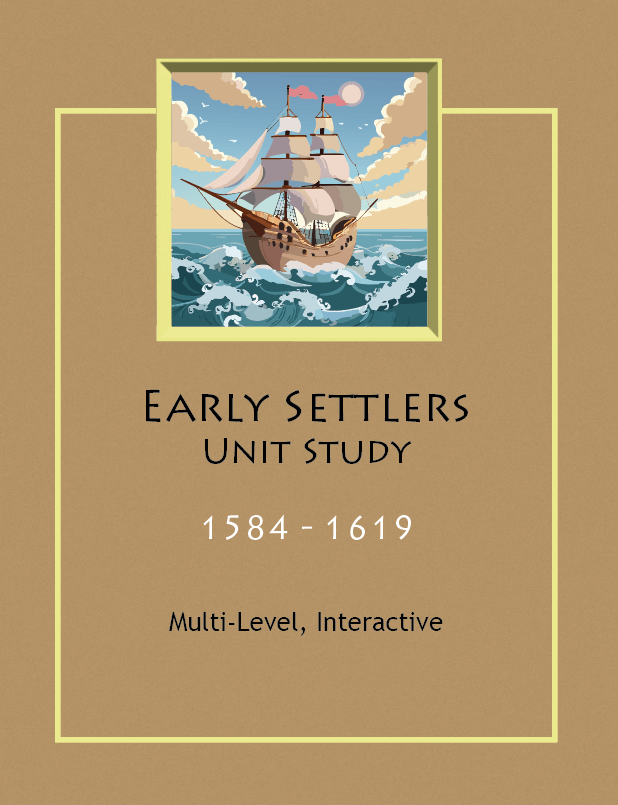
Available in Paperback OR Printable Download
199 pages (Includes Student Pages, Teacher Key, Schedule, Maps, Activities, and More)
Print It Now
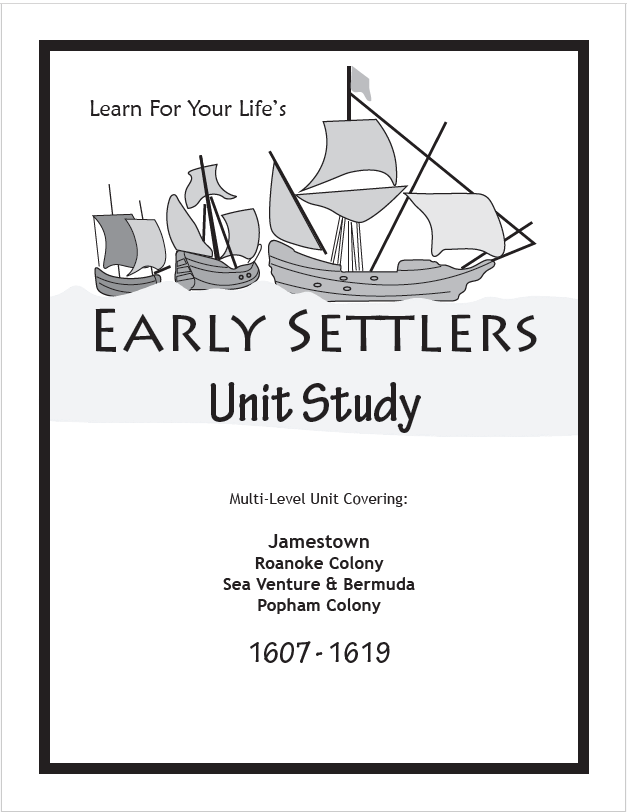
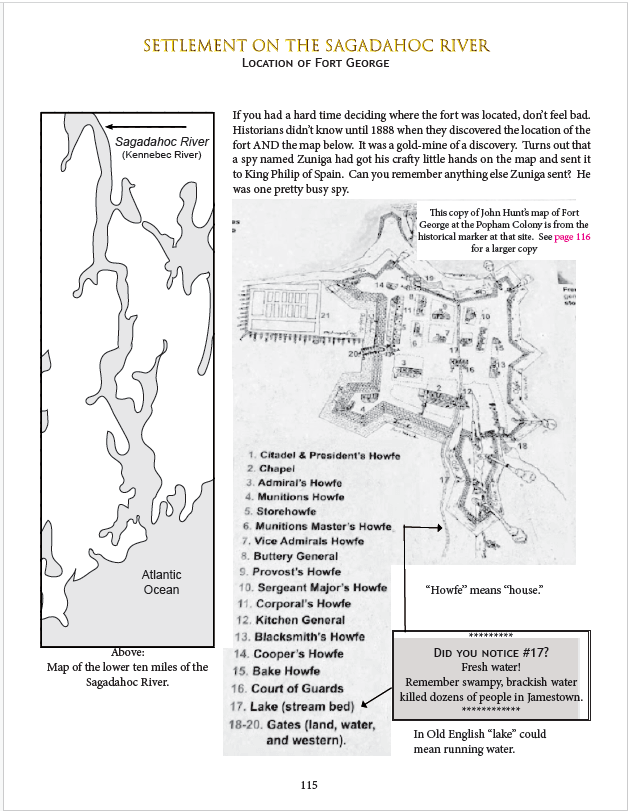
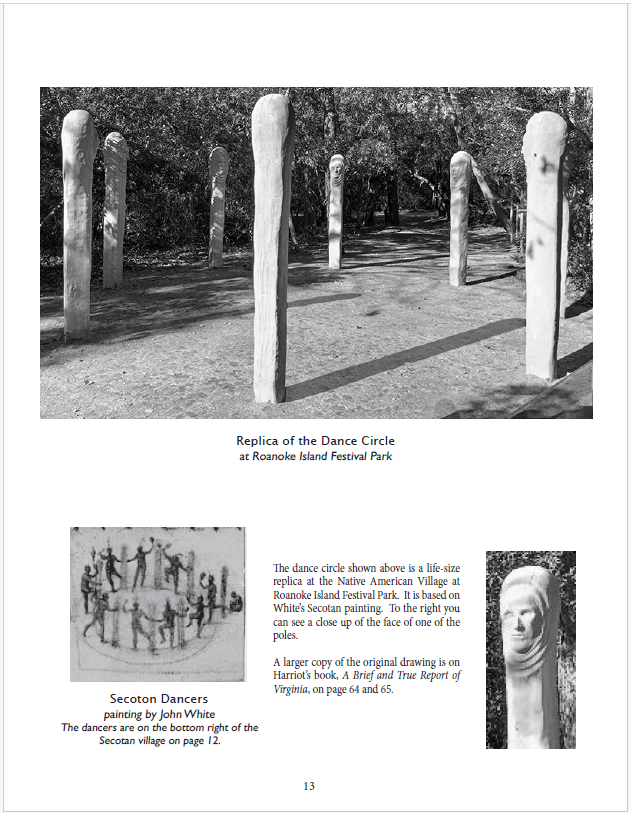
Student and Teacher's Material Included
$5.99 Download - 199 pages
![]()
Softcover Edition - Mailed to You
The same pages are in the softcover book and the printable file. Bound copy is great for repeat use or co-op leaders.
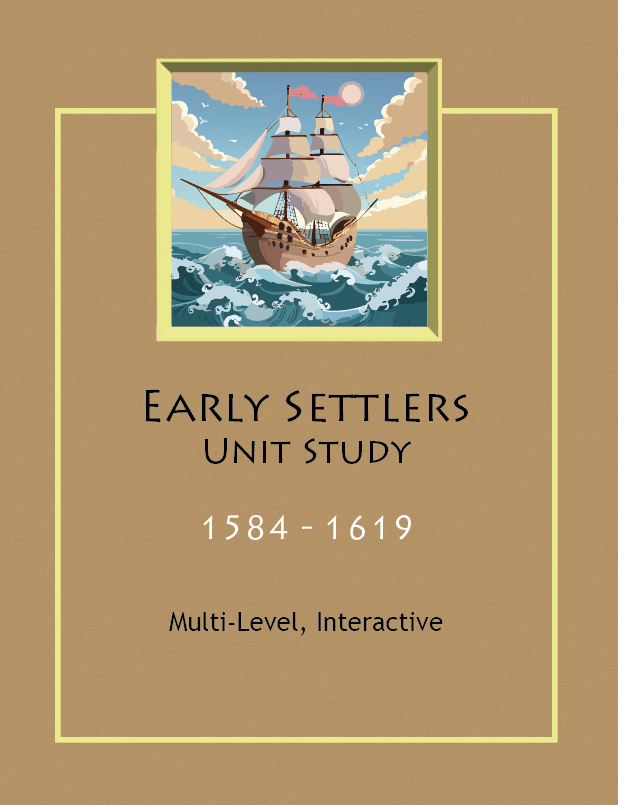
![]()
16.95 Soft Cover Manual
199 pages
Mailed to You
Early Settlers Pages
Check out our other pages for the Early Settlers Unit Study
Get the Lion To Guard Us Unit Study
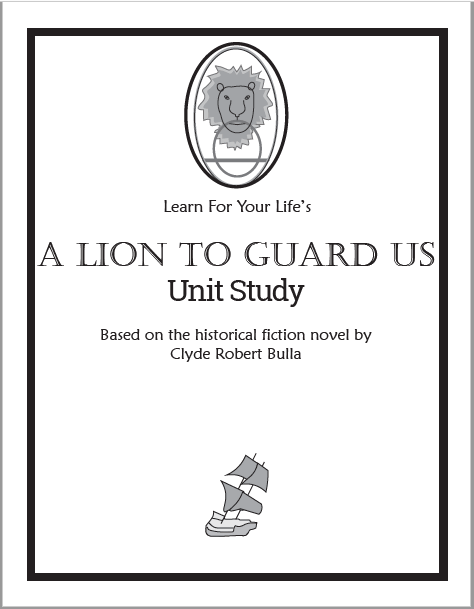
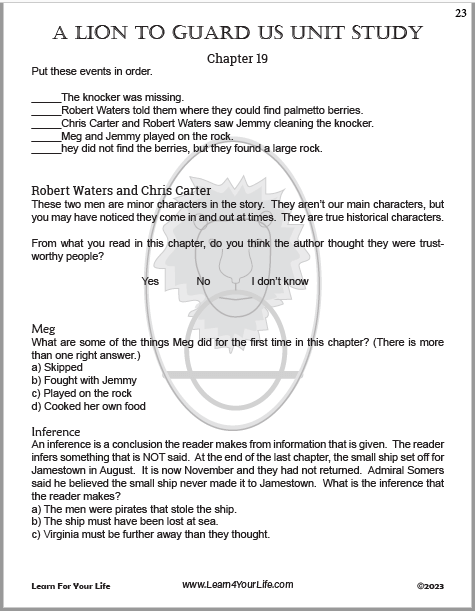
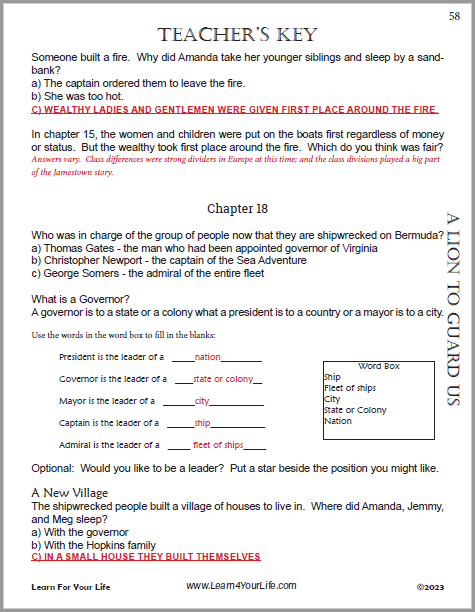
Student Guide AND Teacher's Answer Key Included
$2.99 Download - 78 pages
![]()
Our pages for A Lion To Guard Us
Clyde Bulla's Historical Fiction of Jamestown & the Sea Venture
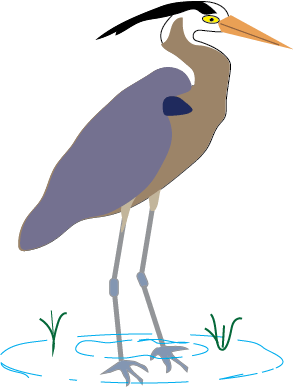
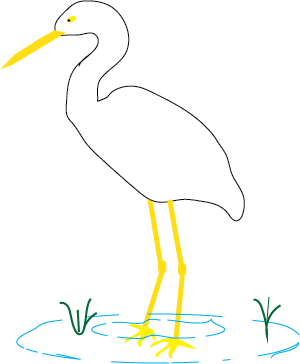
About Our Site
Hands-On Learning

